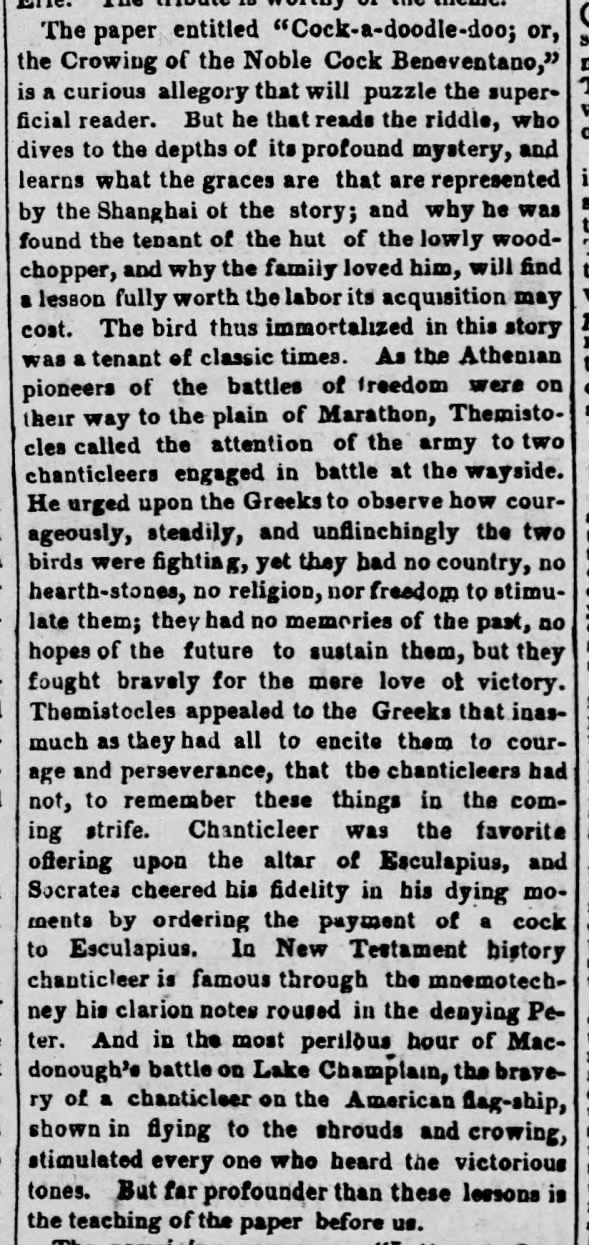In a conversation with Mr. PRENTICE on the subject of memory, I expressed my disbelief in the stories that Themistocles could call the name of every citizen in Athens, and that Racine could recite, word for word, the tragedies of Euripides; and he replied, “You are very much mistaken. The art of memorizing such things is not so difficult as you imagine. When a boy, I knew by heart the first six books of Virgil, and could recite verbatim the whole of Kame’s ‘Elements of Criticism,' Blair's 'Rhetoric,' and Dugald Stewart's 'Mental Philosophy.' Charley Thomason, of Louisville, knew 'Blackstone's Commentaries' by heart; and Cook, the tragedian, memorized on one occasion the entire contents of a daily newspaper. Dr. Bell does not seem to forget anything whatever. Shelley, you know, claims that the human mind is capable of comprehending. all that ever was or ever will be."
"George D. Prentice," Studies in Literature, Second Edition (Philadelphia, 1871) page 56.
Prentice's assistant editor around this time was Paul R. Shipman, also "a fine classical scholar, and an able and vigorous writer" according to Griffin.
Whoever he was, the Louisville reviewer did not mention Melville by name or indicate that he knew who had contributed the "paper" allegory titled Cock-a-doodle-doo. The first part of the Louisville notice was reprinted in a Nashville newspaper, as previously shown on Melvilliana
Introducing the glowing Harper's notice, the Republican Banner and Nashville Whig (December 3, 1853) explicitly credited the Louisville Journal, but I missed that important detail when transcribing the response to Melville's contribution a few years back. Turns out the editorial praise of Melville's story was abridged in the later Nashville version.
 30 Nov 1853, Wed The Courier-Journal (Louisville, Kentucky) Newspapers.com
30 Nov 1853, Wed The Courier-Journal (Louisville, Kentucky) Newspapers.com
The paper entitled "Cock-a-doodle-doo; or the Crowing of the Noble Cock Beneventano," is a curious allegory that will puzzle the superficial reader. But he that reads the riddle, who dives to the depths of its profound mystery, and learns what the graces are that are represented by the Shanghai of the story; and why he was found the tenant of the hut of the lowly wood-chopper, and why the family loved him, will find a lesson fully worth the labor its acquisition may cost. The bird thus immortalized in this story was a tenant of classic times. As the Athenian pioneers of the battles of freedom were on their way to the plain of Marathon, Themistocles called the attention of the army to two chanticleers engaged in battle at the wayside. He urged upon the Greeks to observe how courageously, steadily, and unflinchingly the two birds were fighting, yet they had no country, no hearth-stones, no religion, nor freedom to stimulate them; they had no memories of the past, no hopes of the future to sustain them, but they fought bravely for the mere love of victory. Themistocles appealed to the Greeks that inasmuch as they had all to encite them to courage and perseverance, that the chanticleers had not, to remember these things in the coming strife. Chanticleer was the favorite offering upon the altar of Esculapius, and Socrates cheered his fidelity in his dying moments by ordering the payment of a cock to Esculapius. In New Testament history chanticleer is famous through the mnemotechney his clarion notes roused in the denying Peter. And in the most perilous hour of Macdonough's battle on Lake Champlain, the bravery of a chanticleer on the American flag-ship, shown in flying to the shrouds and crowing, stimulated every one who heard the victorious tones. But far profounder than these lessons is the teaching of the paper before us.
- Omoo in Prentice's Louisville Journal
https://melvilliana.blogspot.com/2020/05/omoo-in-prentices-louisville-journal.html
- Notice of Moby-Dick in Louisville Daily Journal
https://melvilliana.blogspot.com/2017/02/notice-of-moby-dick-in-louisville-daily.html
- Pierre in Louisville KY
https://melvilliana.blogspot.com/2020/02/pierre-in-louisville-ky.html


No comments:
Post a Comment